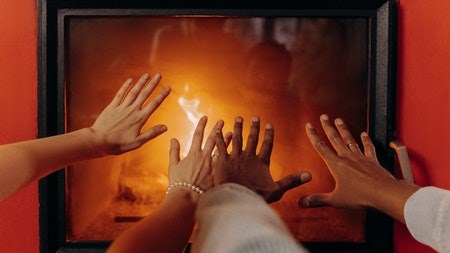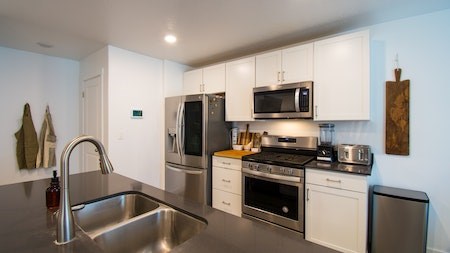Using portable or wall-mounted heaters is a convenient way to raise your room temperature quickly and add warmth to any space.
Room heaters are available in various sizes and styles and can help offset utility costs during cold winter months. Many electric space heaters also have special features such as automatic oscillation and remote digital controls for convenient operation.
To decide which heater to buy and whether a heater will adequately heat your space, you need to take into account the following:
- The outdoor climate.
- The height of the ceiling and the size of the room to be heated.
- Whether adjacent rooms are heated.
- Insulation levels.
- Whether the room gets direct sunlight.
- Window sizes and whether they have solid curtains, blinds, or are double glazed.
- How much it will cost to operate.
Heater types
Electric heaters fall under three heating technologies: radiant, convection and fan-forced.
- Convection heaters typically provide even heating for a whole room.
- Radiant heaters deliver fast spot heating in small spaces.
- A fan heater has an internal fan that blows across a heating element.
Micathermic heaters produce both radiant and convection heat, with the heating element covered in thin sheets of mica. These space heaters are usually slimmer than other heaters, making them useful for heating small spaces.
Some wall heaters are mounted on a wall with brackets, whereas others are recessed into the wall. These are often found in hotels, bathrooms, and rooms with limited space and are usually hard-wired into new construction, so they are not portable.
Capacity
Assessing your heating needs will help you decide which heater is best for you and your family.
Look for a space heater rated for the approximate size of the room you want to heat. A heater that's too small will have to work too hard to warm your space, wasting energy and increasing your energy bill.
A typical 1 500 Watt heater will be suitable for a room of up to 50 m2. However, this will depend on the heating technology, indoor environment and the application. Some portable heaters may also be able to heat more space.
Energy-efficient heaters
Ceramic, infrared, and oil-filled radiant heaters are the most popular energy-efficient space heaters.
Ceramic
Ceramic heating plates quickly warm up the metal coils attached to the ceramic plates, dispersing heat into the room. In addition, they are compact and smaller, making them easier to move from one room to another.
Infrared
Infrared bulbs are designed to provide 5 000 to 7 000 hours of use. Soft metals – like copper - or quartz are conducive to dispersing heat. Like the sun, infrared heaters warm people and objects in their direct path.
Oil-filled radiators
Wide fins allow effective distribution of heat through the hot oil. Even when switched off, the metal surface of the oil heater continues to radiate heat by means of convection without additional energy usage.
Costs
To calculate how much a space heater will cost to run, you must first determine how much you pay for electricity per kilowatt-hour. This should be indicated on your electricity bill or prepaid meter voucher.
Next, determine the amount of time the heater will be in operation - usually in hours - and then convert the kilowatts used per hour by dividing the maximum wattage of the heater by 1 000.
For example, 10 cents/kWh x 6 hours x 1.5 kilowatts per hour = 90 cents a day.
To get the average monthly cost, multiply 90 cents a day by 30, which comes to R27.
Gas heaters
Gas heating can be an effective option. With loadshedding set to be with us for some time, a gas heater is an excellent option.
Keep in mind that portable gas heaters should not be used in rooms that are too small for their rated capacity due to the emissions they produce. Also, they require regular maintenance every couple of years or so to avoid problems with the emissions.
For fast heating, choose the biggest capacity heater suitable for the room size. A lower capacity heater still heats the room but will take longer to reach the desired temperature. Keep in mind that a larger gas heater than necessary means wasted money upfront and higher ongoing running costs. On the other hand, underspending means you won’t be able to heat your room correctly.
For a small room (29 to 42 m2), you will need a gas heater with an output of 2.9 to 4.2 kW. A 46 to 66 m2 room will need a 3.4 to 6.6 kW heater, and a large room (52 to 82 m2) will require a 5.2 to 8.2 kW heater.
Energy saving tips
In addition to using an energy-efficient space heater, there are other ways to minimise energy costs.
Insulate leaky windows and doors because small airways and cracks in windows and doors will negate any energy savings due to drafts. Apply silicone or putty to seal up drafts and cracks.
Add layers. Wear an extra jersey or tracksuit top when it's cold, wear thick socks, and get under the blankets.
Close doors to the room you’re in, if possible. This will minimise the need to heat up the entire house.
Writer : Sarah-Jane Meyer



